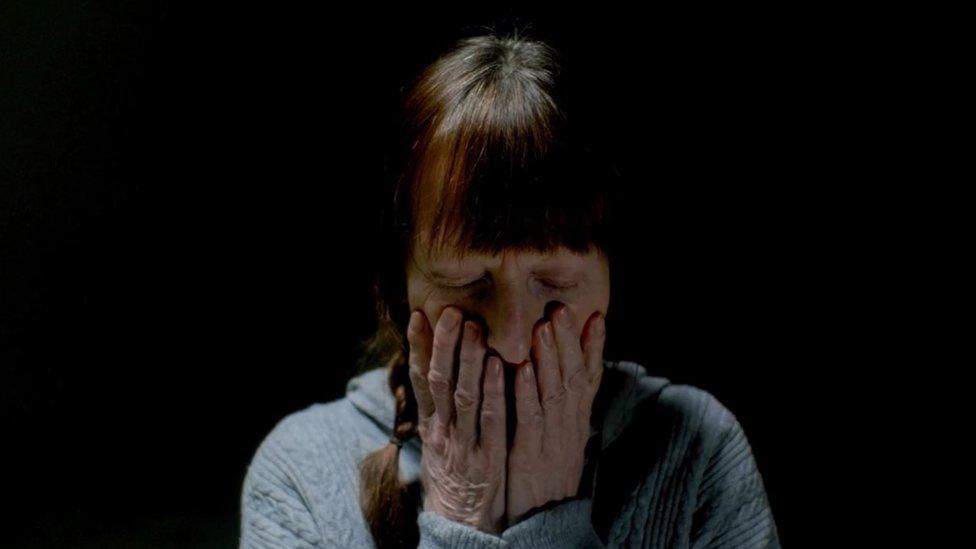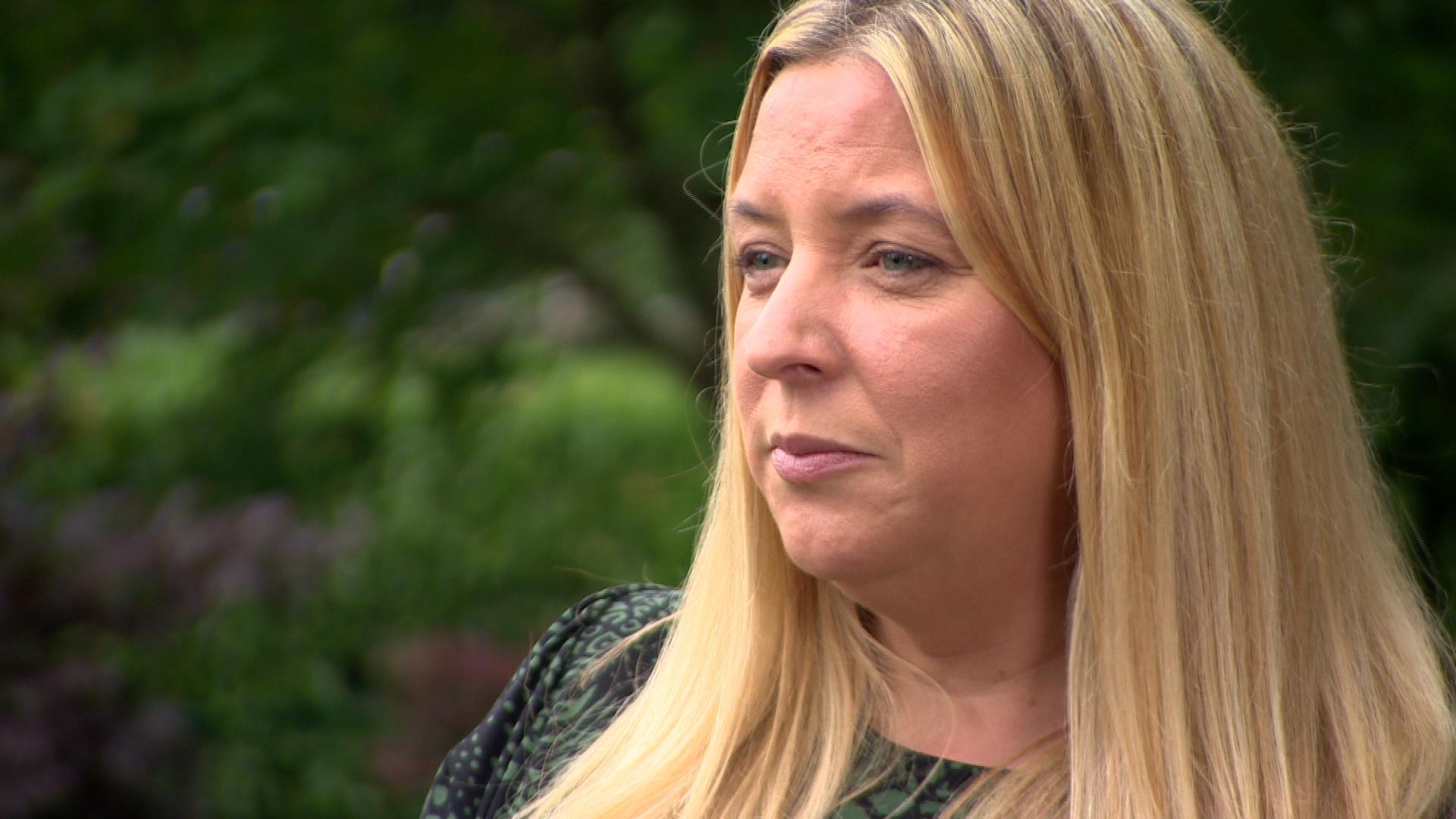Non-fatal strangulation: 'I could feel a crushing around my neck'
- Published
Three women tell BBC News NI about their experiences with non-fatal strangulation
Perpetrators of non-fatal strangulation are not facing the full force of the law as the offence has still to come into effect, campaigners have said.
Non-fatal strangulation became a standalone offence in Northern Ireland in 2022.
Campaigners said the delay was at least, in part, because of the lack of devolved government.
The Department of Justice said it was working towards the commencement of the new offence by summer 2023.
It said significant preparatory work was needed before new offences came into operation.
'There was a rage'
Strangulation is the second most common method of female murder in the UK, after a knife or sharp instrument.
Non-fatal strangulation is seen as a red flag for escalating violence in intimate partner relationships and a possible indicator for future risk of murder or attempted murder.
It became a standalone offence in Northern Ireland under the Justice, Sexual Offences and Trafficking Victims Act 2022, external.
It has not yet come in to force, meaning perpetrators cannot be charged or tried in court.
They are currently being charged with other offences.
A similar law was passed in England and Wales in June 2022 and is currently being used in Northern Ireland.

'My eyeballs were bulging'
Three women spoke to BBC News NI anonymously about their experiences of non-fatal strangulation and reveal the sentences handed down to the perpetrators.
"There was a rage, a darkness in his eyes, he charged towards me with his hands out, wrapped them round my neck and pinned me against the wall," one woman said.
"I remember thinking - I hope he doesn't know that he has to keep strangling me even after I pass out if he wants to kill me.
"He got community service and a suspended sentence."
The second survivor said: "I was pretending to be asleep. He straddled me and put both hands around my throat. All I could hear were the squeals of my kids.
"Then I heard him asking me if I was ready to die, telling me I'd forced him to do this.
"He was sentenced to probation... he attacked his next partner after that."
The third woman said she was lying in bed when she "suddenly could feel an enormous crushing around my neck".
"My eyeballs were bulging, it felt like I was drowning. I lay perfectly still, it was like a primitive instinct, like an injured bird.
"There was no bruising, he got a 12-month suspended sentence."

Women's Aid Northern Ireland said the delay was at least in part down to the lack of a sitting Stormont assembly.
Sonya McMullan, Women's Aid Regional Services Manager, said: "We're really angry. As an organisation we have campaigned for over 40 years for women, children and young people.
"We hoped it would be early this year but it hasn't gone live as yet. There is a lot of preparation that we need to do including training for first-line responders, not just the legal profession.
"It would be really good to have a functioning assembly to have a budget, resources for this. It sits over several Stormont departments."
Dr Catherine White, the Medical Director at the Institute for Addressing Strangulation, successfully campaigned for the change in the law in England and Wales.
"One of the reasons we were keen to have a stand-alone law was that too often strangulation was being treated the same as a slap, punch or kick and yet in term of the danger of it - it's very different," she told Good Morning Ulster.
"The neck is very vulnerable - there's the airway and on either side of the airway are blood vessels so any significant pressure can stop blood returning from the brain and lead to a stroke," she said.
She added her research showed more than a third of victims thought they were about to die.
"In terms of psychological terror this is extreme," she said.
Police are currently working on training to help officers.

Det Supt Lindsay Fisher said they would be focusing on how to recognise and understand this type of violence when speaking to victims.
"Officers will be thinking about asking what happened, did you lose consciousness, did you lose bowel or bladder control?
"There's lots of different things to focus on, but a key thing is also the amount of pressure that has to be applied to the neck for certain things to happen.
"Police will understand, for instance, the force of pulling a trigger and what that level of injury, that force could present in a victim.
"The fact this is a new offence on its own highlights the gravity of it."
'Charges rarely levelled'
District Judge Barney McElholm has described this type of attack as the perpetrator's "weapon of choice".
"I would say strangulation cases are definitely on the increase, it's a tactic that's used by abusers more and more. In a lot of cases there is no mark left and it's a way of controlling and instilling fear in the victim."
On the current legislation he said "charges are very rarely levelled in strangulation cases".
"At the moment we're reduced to prosecuting them as common assault, maximum sentence six months, and then can only be dealt with in the magistrates' court.
"That's a very poor situation. I would like to see those cases go to the crown court, which has much higher sentencing powers."
The Department of Justice said: "There is significant preparatory work needed before new offences come into operation, which may include technical changes, secondary legislation and training of frontline staff.
"Key partners and stakeholders are involved in the process through a working group dedicated to the non-fatal strangulation offence and a wider implementation group, and have been updated on the timeline and the preparatory work required."
If you are affected by domestic abuse, there is a range of support services available via the BBC's Action Line page.
Related topics
- Published5 January 2021

- Published1 December 2022

- Published21 February 2022

- Published27 September 2022
